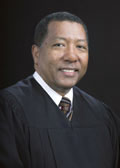Fed judge says Prop 8 videos should be released

James Ware
On the same day a Broadway play is to premiere to highlight the transcripts from the landmark Proposition 8 trial, a federal judge has ordered release of videotapes of the trial.
The September 19 order from U.S. District Court Chief Judge James Ware enables public release of the videotapes beginning September 30, unless there is stay of the order from a higher court.
But proponents of Proposition 8 have appealed every other conflict they have lost and are likely to appeal this one, too, meaning the videotapes may not necessarily be available to the public on September 30.
Attorneys for two same-sex couples challenging California’s same-sex marriage ban filed a motion seeking release of the videotapes publicly, even though they were originally created for use by then District Court Chief Judge Vaughn Walker. Walker used the videotapes in preparing his decision, in August 2010, declaring Proposition 8 in violation of the U.S. Constitution. But the U.S. Supreme Court had prohibited any public broadcast of the trial proceedings outside the San Francisco federal courthouse.
Judge Ware, in acting on the plaintiff couples’ request to release the videotapes, asked attorneys during an August 29 court hearing whether the videotapes could be released now that the trial is over. And, importantly, he asked whether the videotapes should be considered part of the judicial record of the trial.
In his ruling September 19, Ware said the videotapes are part of the official record of the trial and that, “once an item is placed in the record of judicial proceedings, there must be compelling reasons for keeping that item secret.” He said “no compelling reasons exist” to continue barring public release of the videotapes.
Ware said the Supreme Court’s order in January 2010, barring broadcast of the trial proceeding, was limited to a narrow procedural question implicating new rules for the 9th Circuit’s pilot program of allowing some trials to be broadcast. The Supreme Court’s order barring broadcast then, said Ware, “does not provide ‘compelling reasons’ to overcome the strong presumption in favor of public access” to the videorecording “now that the trial is over and the digital recording has entered the court record.”
Ware completely rejected Yes on 8 attorneys’ arguments that public availability of the videotapes would have a chilling effect on the free speech of potential witnesses opposed to same-sex marriage.
“[T]he Court finds that this contention is mere ‘unsupported hypothesis or conjecture,’ which may not be used by the Court as a basis for overcoming the strong presumption in favor of access to court records.”


Leave a Reply